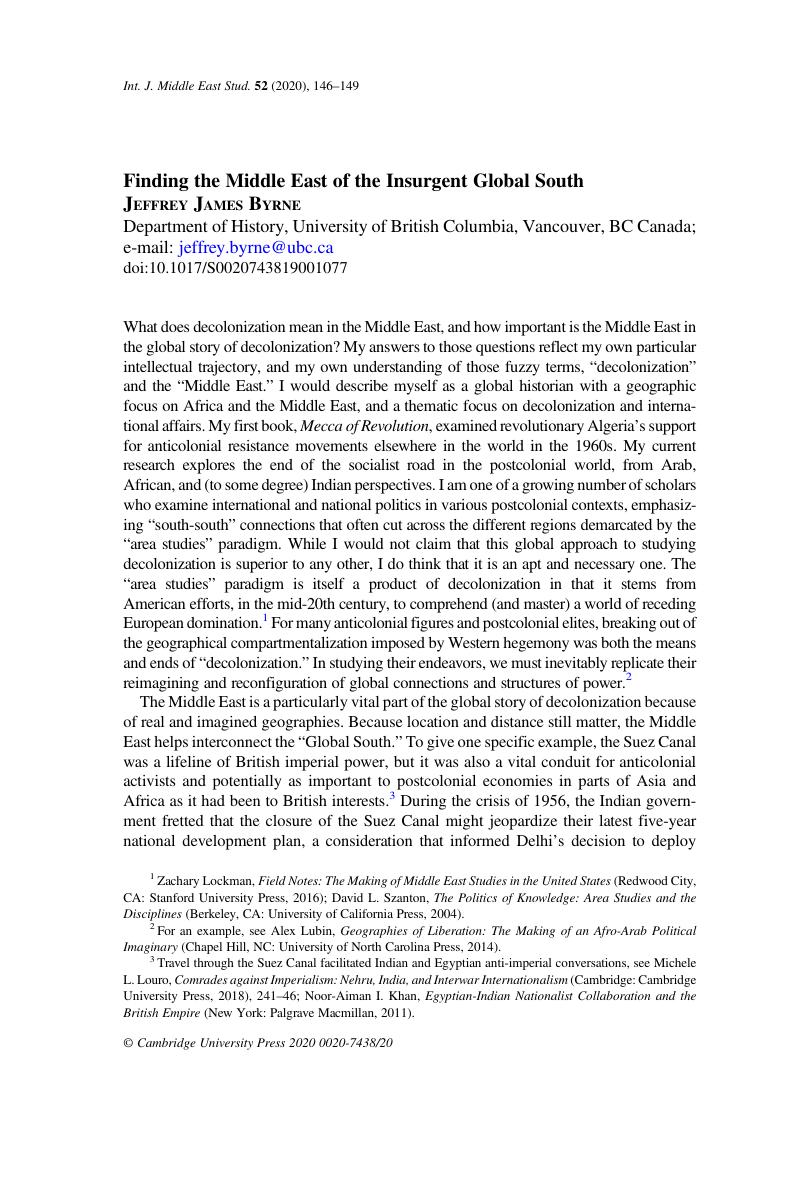Published online by Cambridge University Press: 04 March 2020

1 Lockman, Zachary, Field Notes: The Making of Middle East Studies in the United States (Redwood City, CA: Stanford University Press, 2016)Google Scholar; Szanton, David L., The Politics of Knowledge: Area Studies and the Disciplines (Berkeley, CA: University of California Press, 2004)Google Scholar.
2 For an example, see Lubin, Alex, Geographies of Liberation: The Making of an Afro-Arab Political Imaginary (Chapel Hill, NC: University of North Carolina Press, 2014)Google Scholar.
3 Travel through the Suez Canal facilitated Indian and Egyptian anti-imperial conversations, see Louro, Michele L., Comrades against Imperialism: Nehru, India, and Interwar Internationalism (Cambridge: Cambridge University Press, 2018), 241–46CrossRefGoogle Scholar; Khan, Noor-Aiman I., Egyptian-Indian Nationalist Collaboration and the British Empire (New York: Palgrave Macmillan, 2011)CrossRefGoogle Scholar.
4 Swapna Kona Nayudu, “India's Moment in the Suez Canal Crisis,” Businessline, 8 November 2016; see also Swapna Kona Nayudu, “The Nehru Years: Indian Non-Alignment as the Critique, Discourse and Practice of Security (1947–1964)” (PhD thesis, King's College London, 2015), 128–48.
5 Davis, Muriam Haleh and Serres, Thomas, eds., North Africa and the Making of Europe: Governance, Institutions and Culture (London: Bloomsbury, 2018)Google Scholar.
6 In addition to the other contributions to this roundtable, see Robson, Laura, States of Separation: Transfer, Partition, and the Making of the Modern Middle East, 1st ed. (Oakland, CA: University of California Press, 2017)CrossRefGoogle Scholar. For an example of recent work on migration and the construction of the Middle East, see Hamed-Troyansky, Vladimir, “Circassian Refugees and the Making of Amman, 1878–1914,” International Journal of Middle East Studies 49, no. 4 (2017): 605–23CrossRefGoogle Scholar.
7 Khuri-Makdisi, Ilham, The Eastern Mediterranean and the Making of Global Radicalism, 1860-1914 (Berkeley, CA: University of California Press, 2013)Google Scholar; Aydin, Cemil, Politics of Anti-Westernism in Asia: Visions of World Order in Pan-Islamic and Pan-Asian Thought (New York: Columbia University Press, 2007)CrossRefGoogle Scholar; Aydin, Cemil, The Idea of the Muslim World: A Global Intellectual History (Cambridge, MA: Harvard University Press, 2017)CrossRefGoogle Scholar.
8 See for example, Jakes, Aaron G. and Shokr, Ahmad, “Finding Value in Empire of Cotton,” Critical Historical Studies 4, no. 1 (2017): 107–36CrossRefGoogle Scholar; Jakes, Aaron, “Boom, Bugs, Bust: Egypt's Ecology of Interest, 1882–1914,” Antipode 49, no. 4 (2017): 1035–59CrossRefGoogle Scholar; Alff, Kristen, “Levantine Joint-Stock Companies, Trans-Mediterranean Partnerships, and Nineteenth-Century Capitalist Development,” Comparative Studies in Society and History 60, no. 1 (2018): 150–77CrossRefGoogle Scholar.
9 Mokhtefi, Elaine, Algiers, Third World Capital: Freedom Fighters, Revolutionaries, Black Panthers (Brooklyn: Verso, 2018)Google Scholar; the Algerian archives contain records of communications and support for groups such as the Irish Republican Army, Quebecois separatists, and black American radicals.
10 Abou-El-Fadl, Reem, “Building Egypt's Afro-Asian Hub: Infrastructures of Solidarity and the 1957 Cairo Conference,” Journal of World History 30, no. 1 (2019): 157–92CrossRefGoogle Scholar; Roberts, George, “The Assassination of Eduardo Mondlane: FRELIMO, Tanzania, and the Politics of Exile in Dar Es Salaam,” Cold War History 17, no. 1 (2017): 1–19CrossRefGoogle Scholar.
11 See chapter four of Byrne, Jeffrey James, Mecca of Revolution: Algeria, Decolonization and the Third World Order (New York: Oxford University Press, 2016)CrossRefGoogle Scholar.
12 Abou-El-Fadl, Reem, Foreign Policy as Nation Making: Turkey and Egypt in the Cold War (New York: Cambridge University Press, 2019)Google Scholar.
13 Özsu, Umut, “‘In the Interests of Mankind as a Whole’: Mohammed Bedjaoui's New International Economic Order,” Humanity 6, no. 1 (2015): 129–43CrossRefGoogle Scholar.
14 On unfinished decolonization, see Baconi, Tareq, Hamas Contained: The Rise and Pacification of Palestinian Resistance (Redwood City, CA: Stanford University Press, 2018)Google Scholar.
15 Takriti, Abdel Razzaq, Monsoon Revolution: Republicans, Sultans, and Empires in Oman, 1965–1976 (New York: Oxford University Press, 2013)CrossRefGoogle Scholar; see also Connelly, Matthew James, A Diplomatic Revolution: Algeria's Fight for Independence and the Origins of the Post-Cold War Era (New York: Oxford University Press, 2002)Google Scholar; and Chamberlin, Paul Thomas, The Global Offensive: The United States, the Palestine Liberation Organization, and the Making of the Post-Cold War Order (New York: Oxford University Press, 2012)Google Scholar.
16 Young, Alden, Transforming Sudan: Decolonization, Economic Development, and State Formation (Cambridge: Cambridge University Press, 2017)CrossRefGoogle Scholar; Dietrich, Christopher R. W., Oil Revolution: Anticolonial Elites, Sovereign Rights, and the Economic Culture of Decolonization (New York: Cambridge University Press, 2017)CrossRefGoogle Scholar; Garavini, Giuliano, The Rise and Fall of OPEC in the Twentieth Century (New York: Oxford University Press, 2019)CrossRefGoogle Scholar.